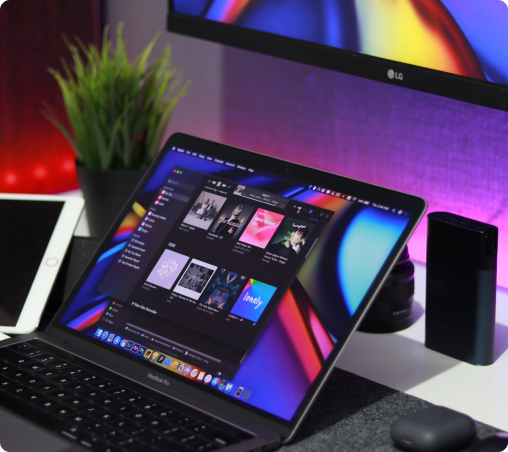
Client
Restaurant Brands International, Inc. (RBI)
Restaurant Brands International is one of the largest global quick-service restaurant companies, generating around $32 billion in sales annually system-wide. 27,000 restaurants in 100+ countries rely on these systems. RBI is home to iconic brands like Tim Hortons, Burger King, and Popeyes. Another franchised brand not involved in this case study is Firehouse Subs.
- Research
- UX
- UI
- Branding
- Usability Testing
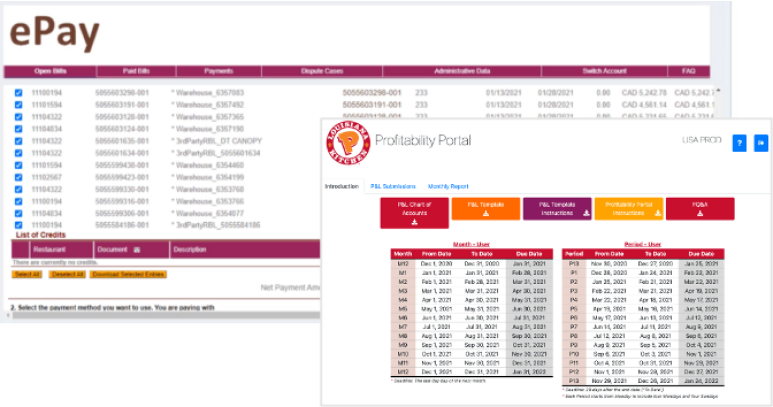
Problem Statement
- RBI engages with franchisees using inefficient manual workflows.
- Digital applications lack integration and extensibility, leading to franchisee dissatisfaction with RBI systems.
- Operational Areas for Improvement:
Website, financial portals, and intranet communications are in dire need of digital transformation to improve the franchisee experience. - Perform a UX audit to improve overall effectiveness of current applications used by franchisees.
- Assess the influence of point-solutions used by franchisees in context of challenges with RBI tool adoption and usage. Point-solutions are standalone solutions for a single use case, which is less efficient than an integrated operations platform.
- Need to map the desired capabilities of franchisees against available system applications and perform a feature gap analysis.
- Provide recommendations to improve negative experiences for both content authors and franchisees.
Project Solution
- Provide recommendations to improve content authoring and franchisee experiences in the system.
- Create concept designs for candidate applications, to clarify the future vision of the RBI system as a whole.
- Perform a UX Audit and concept design to help RBI identify inefficient processes, operations, and technologies.
- A strategy is needed to consolidate and reimagine IT application portfolio to improve franchisee experience and optimize operational costs.
- Provide self-service tools for franchisees to decrease franchisee support cycle time and get the most out of a franchisee ecosystem’s potential.
- By identifying pain points and redesigning digital touchpoints, the new launch will impact 30,000 Franchisees worldwide.
- Franchisees want to increase ease of doing business with RBI.
- RBI wants to help franchisees use tools more efficiently, to alleviate frustration.
- Franchisees want reliable and transparent processes updated regularly by RBI.
- Franchisees want a more comprehensive and faster onboarding experience.
- Achieve quicker support turnaround times to respond to customer needs at the restaurant locations faster.
- Create concept designs to explore what these RBI system apps could become in the future.
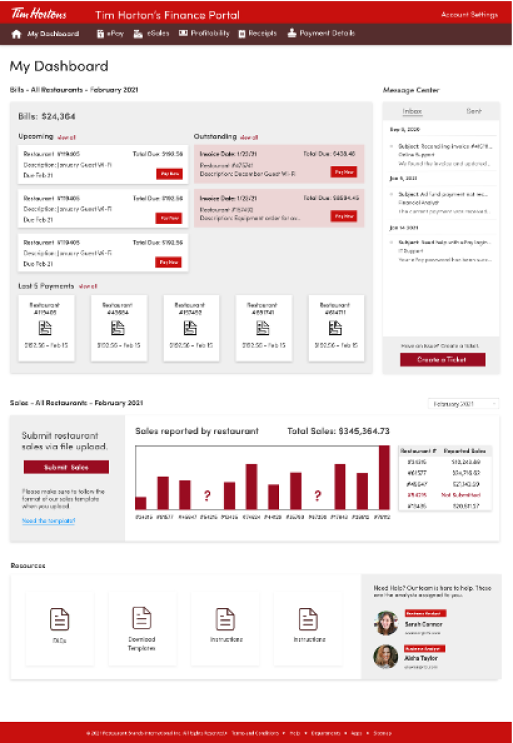
Our End-to-End Process
Trianz Digital Studio worked with the client across four phases. This phased approach ensures that our team has all the information it needs to provide targeted support to the client at each stage.
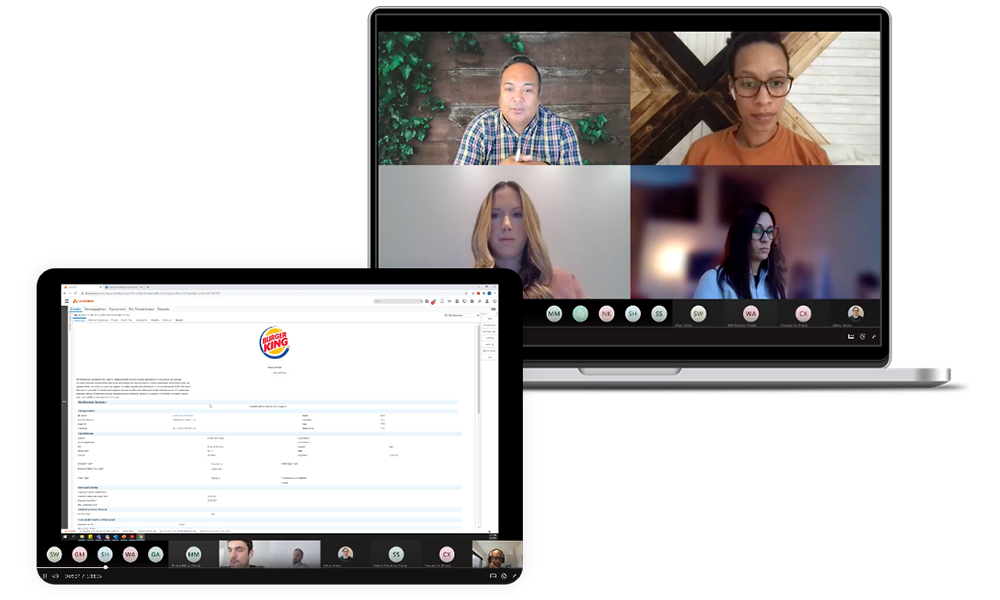
Learning
After careful analysis and research, Digital Studio identified the following problems with RBI’s communication platform.
Differing Needs Among Franchisees
-
Franchisees have different needs according to brand, region, and size.
-
A persona-based approach is needed to effectively cater to groups of franchisees.
-
Lack of categorization in the information structure negatively impacts readability.
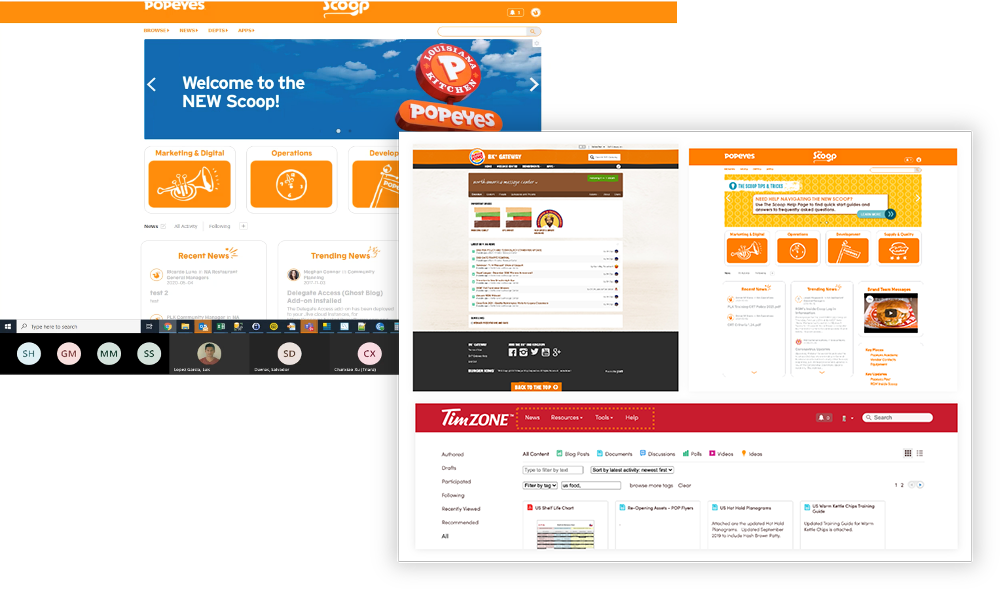
Analysis
Information is Hard to Find
-
Written content is not targeted to groups of franchisees for each brand, region, and size.
-
The content itself is hard to digest.
-
Franchisees exert extra effort to comprehend and frame guidelines for their individual operations.
-
Duplicated content sources mean franchisees are confused as to what is old or current information.

Affinity Mapping
Lack of Tool and Process Onboarding
-
Franchisees receive minimal training on tools and processes.
-
Lack of documentation and support when learning about new tools.
-
Self-discovery and self-research by franchisees take up valuable person-hours.

Mismanaged Content Authoring
The communications team uses Jive intranet software. A lack of process and tool onboarding makes it hard for employees to control content and presentations.
An absence of intranet site analytics. This means the communications team cannot track page views or follow up on content feedback submissions.
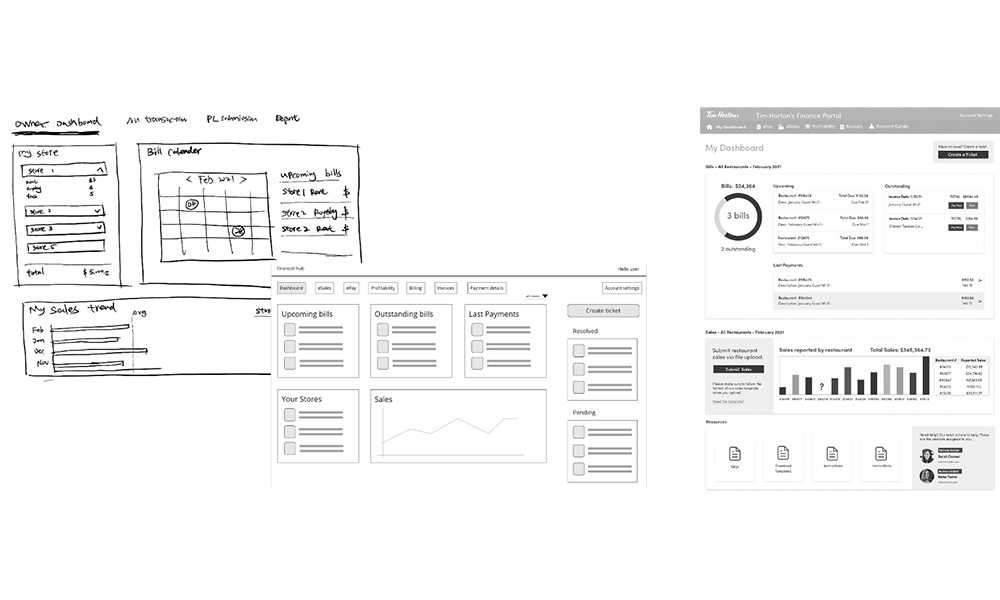
Ideation
-
Differing Needs Among Franchisees
-
Franchisees have different needs according to brand, region, and size.
-
A persona-based approach is needed to effectively cater to groups of franchisees.
-
Lack of categorization in the information structure negatively impacts readability.

Analysis of IA
Information is Hard to Find
-
Written content is not targeted to groups of franchisees for each brand, region, and size.
-
The content itself is hard to digest.
-
Franchisees exert extra effort to comprehend and frame guidelines for their individual operations.
-
Duplicated content sources mean franchisees are confused as to what is old or current information.

Lack of Tool and Process Onboarding
-
Franchisees receive minimal training on tools and processes.
-
Lack of documentation and support when learning about new tools.
-
Self-discovery and self-research by franchisees take up valuable person-hours.

Mismanaged Content Authoring
The communications team uses Jive intranet software. A lack of process and tool onboarding makes it hard for employees to control content and presentations.
An absence of intranet site analytics. This means the communications team cannot track page views or follow up on content feedback submissions.

What Processes Were Used?
First, Digital Studio identified franchisee-facing applications. It also checked the app selection alignment, or which apps are available to which franchisees.
-
10 Application Demos
-
20 Stakeholder Interviews, plus additional input from the communications team
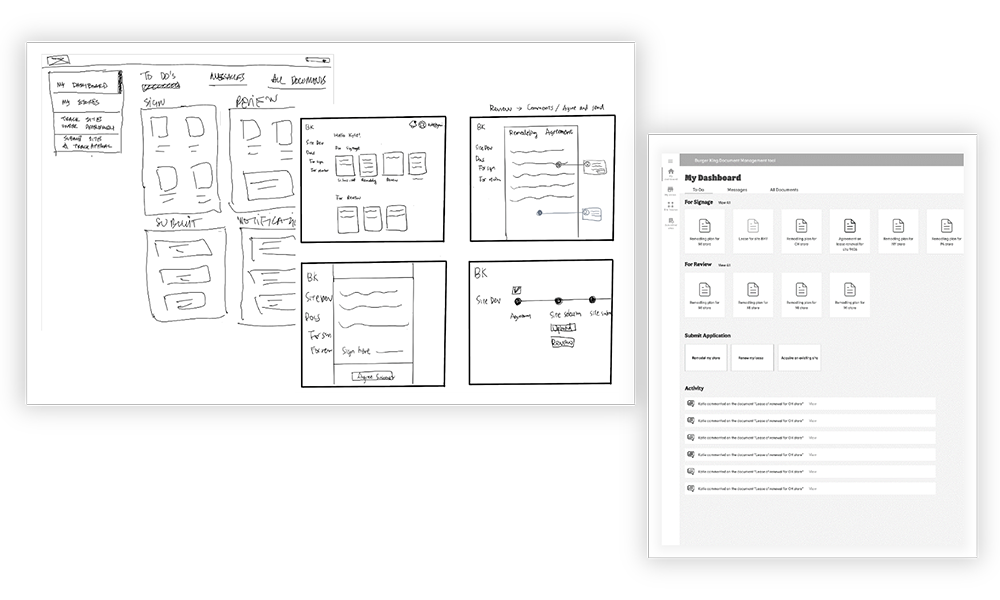
Visual Direction
Competitor exploration offered insight into what other industry players do, and how RBI can transform its own system experience.
An in-depth user experience (UX) audit took place on the individual brand environments:
-
TimZone (Tim Hortons)
-
BK Gateway (Burger King)
-
PLK Scoop (Popeyes)
RBI uses a range of asset, project, and construction management tools to orchestrate its franchisee operations. Our team performed high-level feature research to optimize this tool-stack.
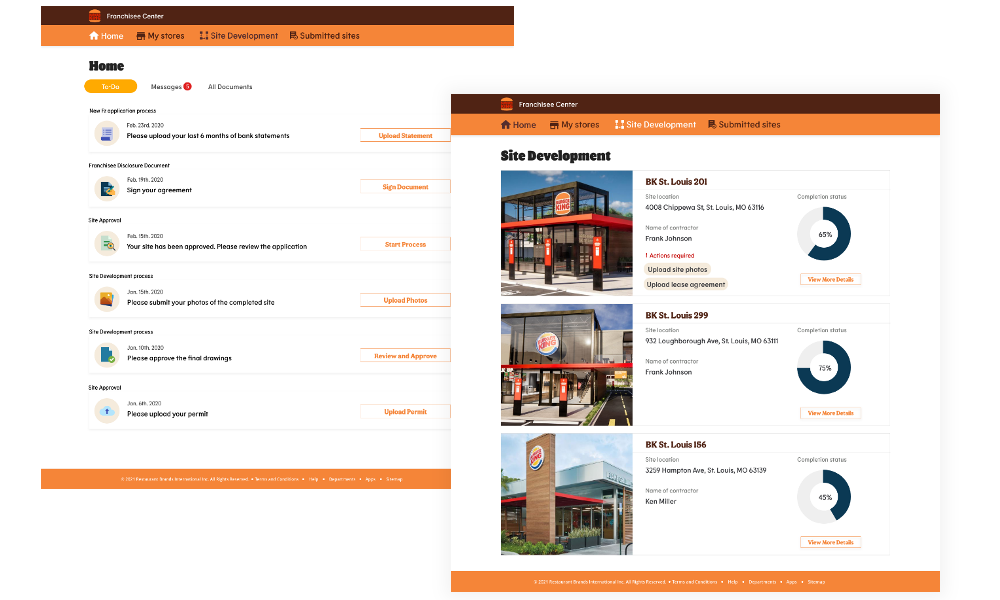
High-Fidelity Mockups
Another high-level UX audit took place for real estate management software Lucernex, and the project and work management platform Smartsheet.
Concept visualizations were designed to clarify the future-state of communication, financial payment, and site development platform experiences.
Multiple concept design iterations were created to explore a range of potential end-states.
This phase was concluded with a final report delivered to RBI, containing Digital Studio recommendations for transforming its systems.

What was the Site Development Used for and How?
According to RBI (the system provider):
-
SmartSheet and Lucernex are used in different capacities across brands and regions for the site development process.
-
Lack of centralized access to deadlines, milestones, site selection management, site development processes
-
Site status unknown internally which complicates archiving the launch day deadline
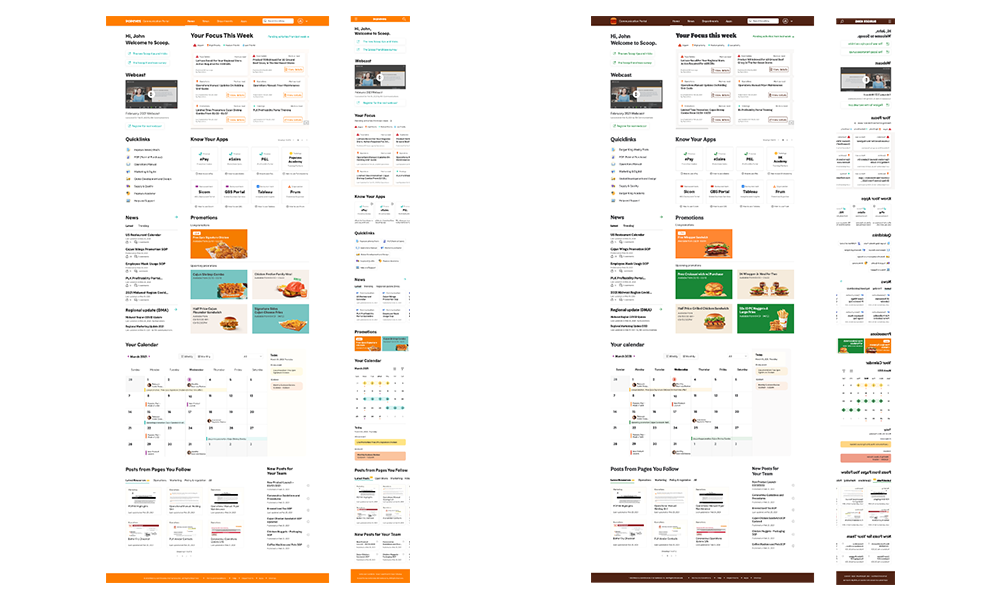
What was the Site Development Used for and How?
According to franchisees (the system users):
-
Low adoption of Lucernex for site submissions and approvals
-
Lucernex lacks transparency
-
Burger King and Popeyes franchisees manage site development employing their own tools and contractors
-
Franchisees are unwilling to use Lucernex as prescribed by RBI

What Was Discovered During Site Development Research?
Throughout our research, Digital Studio discovered the following needs and challenges relating to site development.
System unification was needed to:
-
Connect different collaborators in a centralized system
-
Centralize site development, agreement, and contracts
-
Reduce communications via email, phone, text

What Was Discovered During Site Development Research?
Throughout our research, Digital Studio discovered the following needs and challenges relating to site development.
Process transparency was needed to:
-
Help franchisees understand what to expect throughout the experience
-
Reduce the sense of “being left out” with a direct line to field teams
-
Prescribe recommended actions as franchisees scale up their businesses over time

What Was Discovered During Site Development Research?
Throughout our research, Digital Studio discovered the following needs and challenges relating to site development.
Relating to system capabilities:
-
A lack of data analytics in Lucernex and SmartSheet, leading to inefficient workflows such as manual Excel reporting
-
Document management features are present, but not utilized

What Was Discovered During Site Development Research?
Throughout our research, Digital Studio discovered the following needs and challenges relating to site development.
A high tool-learning curve meant:
-
New and existing RBI team members repeatedly train in Lucernex and SmartSheet.
-
The learning curve is caused by tool complexity, and a lack of support or documentation by the vendor.
The Business Impact
This was a long and difficult process for RBI, its franchisees, and the Digital Studio team. Emerging on the other side, we noted the following outcomes.
Experience Design Case Studies
The case studies below are a window into a typical Enterprise Level project experience at Digital Studio. Take a look behind the scenes at how our team delivers meaningful
View Our WorkTogether, we can do great things.
Our team is ready and waiting to hear how we can help you transform your digital experience and create a uniquely “You” solution that modernizes your digital brand.
